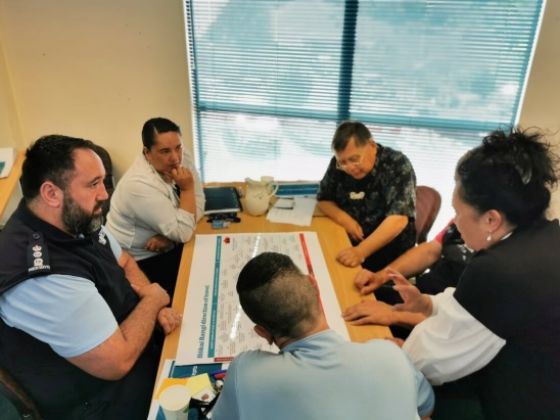Staff key part of co-design

3 December 2020
For Northland Region Corrections Facility (NRCF) Security Manager Ronnie Pike, attending a co-design hui for Māori Pathways was an eye-opener.
Māori Pathways is a four-year programme to support the corrections system to be more effective by using kaupapa Māori and whānau-centred approaches. Programmes are being co-designed with whānau, iwi, and hapū Māori; and other organisations and individuals independent of Ara Poutama Aotearoa, including those with lived experience.
Ronnie was one of six senior NRCF staff who attended the hui which was one of the final stages of the co-design process in one of the phases of human centred design for Māori Pathways in Northland.
“I really enjoyed it. Previously we would all be wrapped up and only dealing with our own areas,” Ronnie says.
“So it was great that we all worked together as one team coming up with similar and thought-provoking ideas in our approaches.
“It was run in a way that made me feel comfortable and able to speak freely without judgement.”
Residential Manager Scott Carr says what the Māori Pathways is seeking to achieve is similar in concept to the intended philosophy of the facility when it opened.
"This time it is being introduced differently. Now the site has matured we are in a better position to try and achieve the initial intent and purpose of why the site was commissioned. Through the revised approach we are looking to form a stronger relationship with out partner Ngāti Rangi, with a clearer understanding of how each other delivers their services and through past experiences how we can better co-habitate in this environment."
Roberta Pedro, Acting Service Manager in Kaikohe Community Corrections was also part of the wananga. She brought two different perspectives to the table, one being experience as a frontline Corrections staff member for the past 12 years but more importantly the perspective from her hapū Ngāti Rangi, the mana whenua at NRCF.
“Ngāti Rangi have recently re-established a working relationship with NRCF and National Office staff. We have really enjoyed participating in this mahi as we have been able to bring a strong Ngāti Rangi tikanga lens to the table to ensure the tāne and their whānau are well supported as they progress through this pathway.”
Māori Pathways Service Design Manager Hirata Titcombe says the hui considered all the information and high level concepts that previous co-design hui had identified as important.
“We develop concepts based on common themes and insights using personas based on the lived experiences. We then drill those down into quite extensive detail so we can test how it will work for different scenarios and people. For example, when we are told that contact with whānau is an important part of a man’s rehabilitation, we look at a whole range things. How does that work when a man’s whānau does not want anything to do with him? What about if his whānau is his mate’s whānau?
“Having such a diverse range of people who have had different roles and experiences within the Corrections system – both inside the prison and in the community - is essential to good design.
“We don’t decide that one person is ‘right’ and another ‘wrong’ – we acknowledge that they all have different experiences and understanding and how might we design a system that utilises all that knowledge?
“What has been heartening about this project is that everyone involved shares a desire to reduce māori re-offending. It is up to us as designers to bring all their thoughts together.”
The outcomes of the co-design process using human centred design and agile practices is being developed into a new operational model with prototyping, testing, and evaluation starting in the New Year and implementation thereafter.

